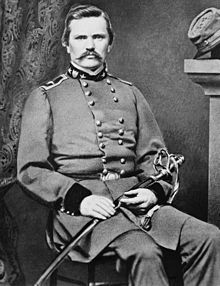 |
| General Simon B. Buckner |
BLAKELY, ALA., October 28, 1863.
General B. BRAGG,
Near Chattanooga, Tenn.:
Before the present movements commenced the Department of East Tennessee was added to your command. In virtue of the authority thus conferred you drew Generals Buckner and Preston with a portion of their troops to your headquarters. While serving there they and their troops are, like others in the army, subject to your orders. The few troops left by them and now remaining in service have been incorporated with those of General Jones, who receives his orders and instructions from the War Department. General Buckner in his present position can give no orders in contravention of the authority of this commanding general, and neither of you should interfere with the operations in Southwestern Virginia, except so far as you may keep General Jones advised of your movements so as to secure co-operation. Officers serving with you will be required to perform their appropriate functions, and restlessenss is not a sufficient reason for removal. Your dispatch was not received until I had started from Mobile. I hope you have communicated with General Hardee at Demopolis.
JEFFERSON DAVIS.
Official Records, Series I., Vol. 52, Page 552.
Davis was returning from Tennessee, having met with Bragg and his generals. They were in a high state of excitement against Bragg, and had signed a round robin asking for Bragg's removal. Bragg had retaliated against Buckner by essentially eliminating his command as an organization (hence the "restless is not a sufficient reason" line in the letter from Davis to Bragg. Beyond these obvious headaches, Davis also had to contend with Bragg and Buckner attempting to give orders to General Jones, whose command in southwest Virginia was outside of his department.
No comments:
Post a Comment